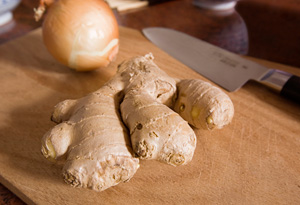The Cure Is in the Kitchen

Chef Aine McAteer has long touted the connection between what we eat and how we feel. She now reveals her number one "kitchen medicine"—ginger—and shares some natural remedies using this tasty root.
When I was a young girl growing up in rural Ireland, one thing I knew for sure was that whatever ailed me, my granny had some sort of a concoction to cure it. This was often motivation for me not to get sick or to will myself well, as these "medicines" were not exactly culinary delights. She had us eating boiled nettles to build our blood and drinking barley water to cure colds and coughs. Castor oil was administered for tummy upsets and constipation, and when there wasn't a twig or a leaf to cure something, holy water to the rescue! Our warts were rubbed with black snails, our sprained ankles wrapped in leaves from the palm tree and our infections drawn out with hot bread poultices.
In more recent years, I seem to have regressed to the ways of days gone by. Being told at age 19 that I would be dependent on medication for the rest of my life was motivation enough for me to seek out natural alternatives. In the days before Google, I had to search far and wide only to be directed back toward the wisdom of my grandmother.
I discovered that I could cook my way to better health, and this was a very enlightening discovery. I became a girl on a mission and continued to discover every day the magical connection between what I ate and my health and vitality. Now, if I feel unwell, I look no further than my kitchen cupboards to find a remedy.
See how ginger can help with arthritis, sore throat, backaches, dandruff and more.
When it comes to kitchen medicine, my number one ally is fresh ginger. Here are just a few of its many benefits:
Ginger is one of my favorite spices to use in cooking, where you can also enjoy its medicinal benefits. The simple dressing for my Sesame Ginger Green Beans can be used not only to jazz up your vegetables, but also to make a delicious marinade for fish or chicken.
Enjoy!
Aine
- Ginger is an anti-inflammatory and can help reduce inflammation associated with conditions such as arthritis, rheumatism and ulcerative colitis. It can either be taken as a drink or combined with a few drops of fresh ginger juice or 1/2 teaspoon of dried ginger with 1 to 2 tablespoons of oil and massaged into the affected area.
- For a sore throat, make an infusion of grated ginger in lukewarm water to gargle.
- Ginger is a natural decongestant and will loosen and expel phlegm in the lungs, so for a cough, cold or other chest conditions such as asthma and bronchitis, drink warm ginger tea. To increase the healing benefits, add a teaspoon of manuka honey, as it is said to have many health benefits, including antiviral, antibacterial and anti-inflammatory properties. To make ginger tea, simply peel a 1- to 2-inch piece of ginger. Cut it into thin slices and simmer with 2 to 4 cups water for about 15 minutes. Strain and drink.
- Ginger is a known digestive aid. It is said to have the ability to enhance fat and protein digestion and increase the production of healthy intestinal flora. The enzyme in ginger called zingibain is said to have similar properties to papain in papaya, known for its ability to help digest protein.
- For lower backache or tension in the kidney area, there's nothing more healing than a ginger compress. Grate a big knob of fresh ginger and tie it in a piece of cotton or muslin. Infuse it in a pot of hot water. Then, wring out hand towels and place them over the area of tension or pain and put a large towel on top to keep the heat in—you want to make sure it's as hot as you can bear, but not burn. Change the towel several times until the area is red. It's easier and more relaxing to have someone else administer the compress. You can also apply the compress to the chest area to treat a cold.
- Sip on some warm ginger tea to calm an upset stomach. It's also an excellent remedy for nausea or seasickness, so take along a flask of ginger tea if you're taking to the water. You can also take it in tablet or capsule form.
- Ginger tea or tablets can also be used to treat morning sickness, but take in moderation during pregnancy. It has been used medicinally to stimulate menstruation, so there is some concern in scientific circles that it could possibly cause miscarriage. There have been no documented cases of this happening, so most herbalists will recommend ginger in small doses to ease morning sickness.
- Ginger is a natural breath freshener, so chew on a little piece to help relieve bad breath.
- Ginger is an excellent dandruff remedy. Grate a knob of fresh ginger and squeeze out about 1 tablespoon juice (you can do this using a small strainer or squeeze between two spoons). Mix with 1 teaspoon of lemon juice and 1 teaspoon of sesame oil, and massage into the scalp. Leave on for about 30 minutes before washing out. Repeat three times a week until the condition improves.
- Take a ginger foot-soak to improve circulation throughout the body. It has antifungal properties, so is effective as a footbath for treating conditions like athlete's foot.
Ginger is one of my favorite spices to use in cooking, where you can also enjoy its medicinal benefits. The simple dressing for my Sesame Ginger Green Beans can be used not only to jazz up your vegetables, but also to make a delicious marinade for fish or chicken.
Enjoy!
Aine
More from Aine






